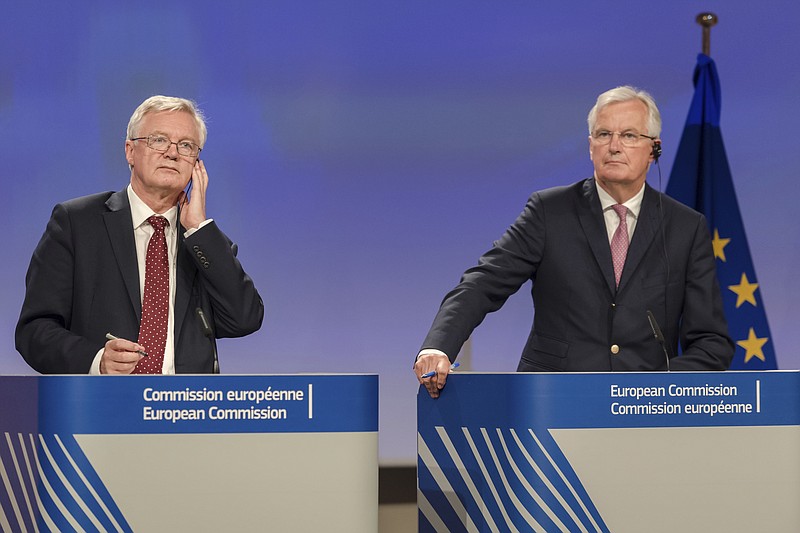BRUSSELS (AP) - The European Union and Britain tiptoed forward during their first full negotiation session on their divorce, but made it clear Thursday that the status and authority of the EU's European Court of Justice in any future deal could be a major stumbling block.
The UK's chief Brexit negotiator David Davis said that four days of talks among dozens of negotiators had provided "a lot to be positive about."
Davis said Thursday in Brussels that he's "encouraged by progress" on key issues, even though negotiators barely moved beyond exploratory issues during talks that are expected to stretch into late 2018.
The EU's chief negotiator, Michel Barnier, continued to show frustration with the lack of detail Britain has shown on the bill it must pay to the 28-nation bloc and the rights of citizens living in each other's nations.
"This week's experience has shown, we make better progress when our respective positions are clear," Barnier said.
Barnier said during a joint news conference that the "clarification of the U.K. position is indispensable for us to negotiate and for us to make sufficient progress on this financial dossier which is inseparable from other dossiers."
So far, estimates on the amount Britain will have to pay have ranged 60 billion and 100 billion euros. Foreign Secretary Boris Johnson has said the EU can "go whistle" for its money if it comes with excessive demands.
"Accounts have to be settled," Barnier countered.
It leaves the negotiators with plenty of work for the rest of the summer and early fall. Since the talks have taken four months to fully kick off, negotiators will now be pressed to make up lost time on a host of wickedly complicated issues which, in comparable international cases like trade agreements, have taken sides years to complete.
Instead, both sides face an official March 2019 deadline, but a practical deadline of the late fall of next year, since any agreement would still face ratification in the EU and its nations.
By October, they need to agree on "sufficient progress" on the rights of citizens living in each other's nations, the bill Britain will have to pay, the border issue in Ireland and the place of the European Court of Justice as an ultimate arbiter. Only once such progress has been achieved in all of these chapters can both sides also start looking at building a new trade and political relationship.
After the first full four-day session, it has become clear that the legal place of the Court of Justice will likely become the lightning rod in the months to come. It was a key issue during the 2016 referendum campaign since British voters felt it that an EU court being superior to a national one took away an essential piece of the sovereignty they so cherished.
Yet Barnier insisted EU citizens also deserve full protection. "We want our citizens to continue to be protected by EU law, for which reason fundamental importance is placed on the role of the ECJ."
